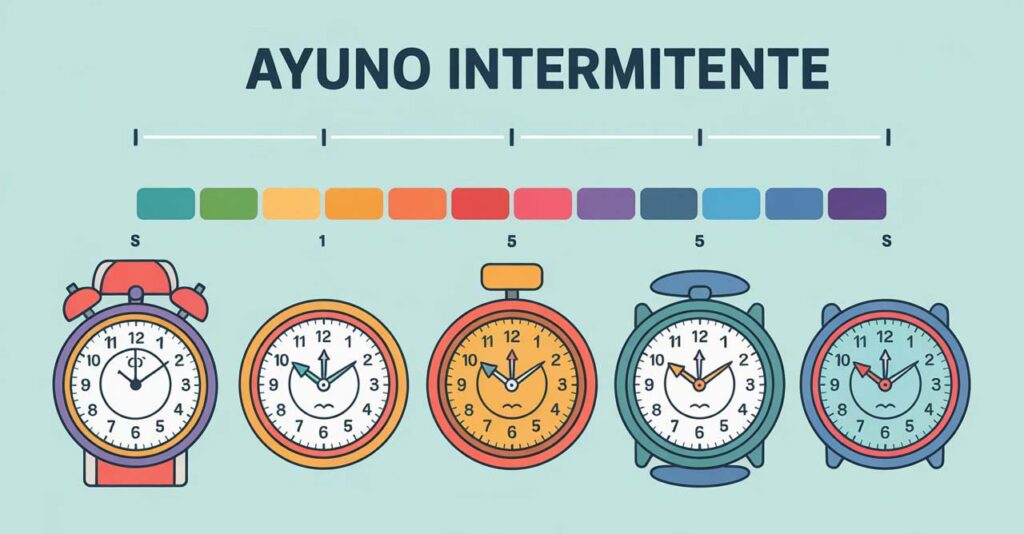
The intermittent fasting has become one of the nutritional strategies most popular of recent years, and it is not a coincidence. This ancient practice, which consists of alternating periods of eating and periods of fasting, has captured the attention of scientists and health professionals for its multiple benefits for the body.
What is intermittent fasting and how does it work?
The intermittent fasting is not a diet in the traditional sense, but a pattern of eating that divides the day or the week in periods of fasting and feeding. Unlike many diets, does not specify what foods you should eat, but rather when you should do it.
During periods of fasting, the body undergoes a series of metabolic changes significant:
- Level of hormone: insulin levels decrease, facilitating burning of fat
- Cellular repair: activates autophagy, a process where the cells removed, and recycle damaged components
- Gene expressionChanges related to longevity and protection against disease
- Metabolic change: The body shifts from using glucose as its primary source of energy to burn stored fat
These biological processes are the key behind the many benefits of intermittent fasting for your health.

Proven benefits of intermittent fasting
Scientific studies have documented numerous benefits associated with this practice:
1. Weight loss and body composition
The intermittent fasting promotes fat loss while preserving muscle mass more effectively than many diets conventional. This occurs because:
- Reduces naturally the caloric intake
- Increases growth hormone by up to 500%, favoring the muscular development
- Increases metabolism between 3.6% and 14%
2. Improvement of metabolic health
This practice has a significant impact on markers of health metabolic:
- Improves insulin sensitivity by up to 30%
- Reduces the levels of fasting blood sugar between 3% and 6%
- Reduces chronic inflammation, the source of numerous diseases
3. Benefits cognitive and neurological
The brain also benefits considerably:
- Increased mental clarity and concentration
- Production of brain-derived neurotrophic factor (BDNF), which stimulates the growth of new neurons
- Potential protective against neurodegenerative diseases
4. Regeneration and cellular longevity
One of the most fascinating aspects is its impact on the aging:
- Stimulates autophagy, the ‘recycling’ cell that eliminates damaged components
- Reduces oxidative stress and inflammation
- Promotes the renewal mitochondria, the ‘power plants’ of our cells
Types of intermittent fasting: What is the best for you?
There are different protocols of intermittent fasting. Here are the most popular and effective:
Method 16/8 (Leangains)
The most popular and accessible to beginners:
- 16 hours of fasting
- 8 hour window to eat (for example, from 12:00 until 20:00)
- Ideal for: people with work schedules and conventional beginners
Method 5:2
Consists of:
- 5 days of normal power
- 2 non-consecutive days of caloric restriction (500-600 calories)
- Ideal for: those who prefer not to fast daily
Fasting on alternate days (ADF)
An approach that is more advanced:
- Alternate days of normal eating days of fasting total or minimum consumption
- Ideal for: people with experience in fast looking for faster results
Method OMAD (One Meal A Day)
The most restrictive:
- One meal a day, usually in a window of 1-2 hours
- Fast 22-23 hours
- Ideal for: advanced practitioners, and people adapted to the fast

How to get started with intermittent fasting safely
If you’re thinking of taking the intermittent fasting, these tips will help you to do it correctly:
- Start gradually: Start with a fasting of 12 hours (including sleep) and progressively increased.
- Hydrate properly: During fasting, maintain good hydration with water, unsweetened tea, or black coffee.
- Power quality: In your windows power, gives priority to whole foods, high-quality proteins, healthy fats and complex carbohydrates.
- Listen to your body: If you experience severe dizziness, extreme weakness or any worrisome symptoms, breaks the fast.
- Combine it with exercise: For best results, consider exercising on an empty stomach, especially strength training and cardio at a low intensity.
According to a study published in The New England Journal of Medicine, the intermittent fasting can provide extensive health benefits beyond weight loss, including greater longevity and reduced risk of chronic diseases.
Precautions and contraindications
The intermittent fasting is not suitable for all. Should avoid:
- Pregnant and breast-feeding women
- People with eating disorders, previous or current
- Under 18 years
- People with type 1 diabetes or problems with blood sugar without medical supervision
- Those who are significantly below their ideal weight
Important: always consult with a healthcare professional before starting any regimen of fasting, especially if you suffer from any medical condition.
Frequently asked questions about intermittent fasting
Can I drink liquids during fasting?
Yes, it is recommended to drink water, unsweetened tea and black coffee without additives during the fasting period. These liquids not break the fast and help maintain hydration. Drinks with calories, sweeteners or additives yes disrupt the health benefits of fasting.
Does intermittent fasting slows down your metabolism?
Contrary to popular belief, intermittent fasting to short-term (less than 24 hours) not slows down your metabolism, but you can increase it temporarily. Studies show increases of up to 14% in the basal metabolic rate during periods of fasting controlled.
Can I exercise while fasting?
Yes, many people report benefits when you exercise on an empty stomach, especially for exercises of low to moderate intensity. Training on an empty stomach can increase the burning of fat, but for high-intensity workouts or long-term, some people prefer to do it during your power window.
Conclusion
The intermittent fasting represents a powerful tool to improve metabolic health, promote the loss of fat and potentially extend the longevity. This is not simply stop eating, but to establish a pattern that allows our body to switch between processes of digestion and repair.
The benefits are numerous: from the improvement in insulin sensitivity, to the promotion of autophagy, through a more mental clarity and better weight management. However, it is essential to approach it with knowledge and respect for the signals of our body.
Are you ready to transform your health with intermittent fasting , but you need personalized guidance? Reserve today for a consultation with our expert in nutrition, Paulina Lopassio. She will develop a plan of intermittent fasting – adapted to your specific needs, health goals and lifestyle. Don’t you fly alone on this road – get the professional support that will maximize your results and minimize the obstacles. ¡Agenda your appointment now and take the first step towards a Health Conscious!.
